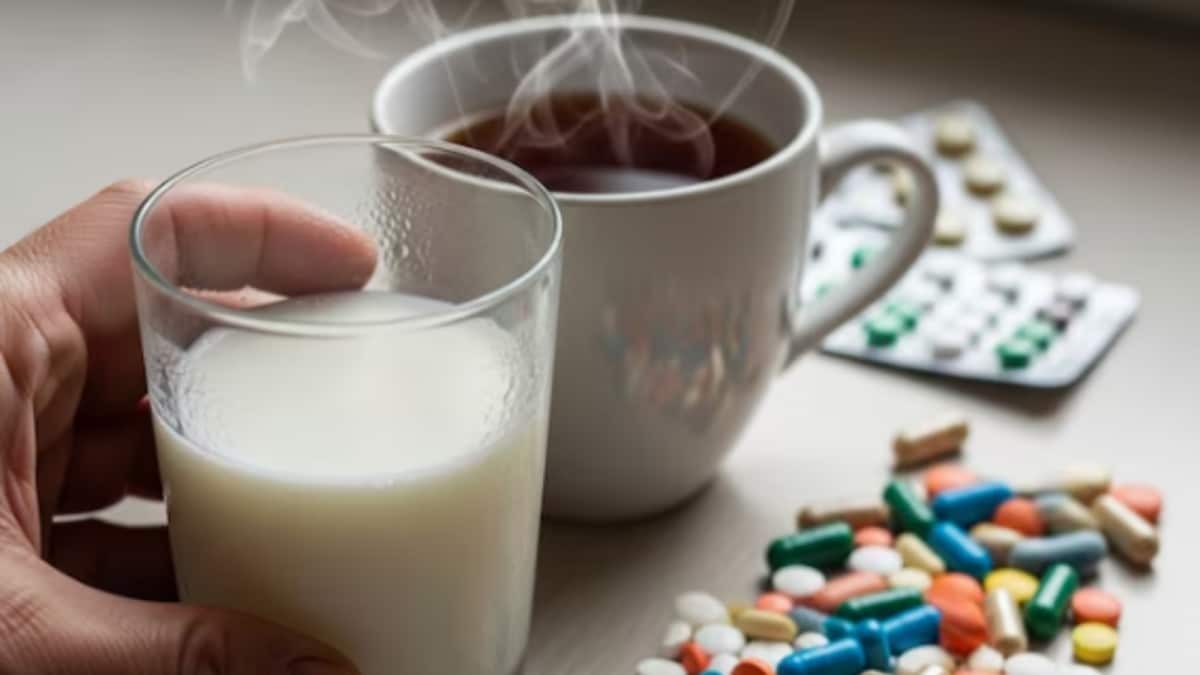Is It Safe To Take Tablets Or Capsules With Tea Or Milk? Here’s What Science Says

Last Updated:August 05, 2025, 17:21 IST
Calcium in milk forms insoluble complexes with drugs like tetracycline, ciprofloxacin, hindering absorption in the gut and reducing the medicine’s effectiveness significantly

The chemical reaction between milk constituents and certain drugs can impair the intended effect of the medicine. (AI Generated/News18 Hindi)
Many people consume medicines with milk or tea, but whether this practice is medically appropriate has been a topic of scientific scrutiny. Scientific evidence suggests that taking several types of medicines with milk can reduce their effectiveness.
This is due to certain components in milk, especially calcium and proteins, which may interfere with how the medicine is absorbed or how it reacts in the body. However, in a few cases, taking specific medicines with milk can be beneficial.
As for tea, it is generally advised that medicines should not be taken with it at all, as compounds in tea may hinder absorption or cause adverse reactions.
Tablets and capsules are typically not recommended to be taken with milk. The chemical reaction between milk constituents and certain drugs can impair the intended effect of the medicine. The extent of the impact depends on the specific medication involved.
How Milk Interferes With The Effectiveness Of Medicines
Milk contains elements like calcium, magnesium, proteins (such as casein), and fats that can chemically interact with certain medicines, reducing their effectiveness or altering their action.
Calcium in milk can form chelate complexes with certain medicines, such as tetracycline and quinolone-group antibiotics like ciprofloxacin. These complexes are poorly soluble, preventing proper absorption of the medicine in the intestines and significantly reducing its effectiveness. For instance, taking tetracycline with milk can reduce its absorption rate by 50–80%, meaning the drug’s impact on the body drops by more than half.
The Problem Worsens When Medicine Is Taken With Milk
Proteins in milk, particularly casein, can bind with certain medicines, preventing their proper dissolution in the stomach or intestines. Milk can also neutralise stomach acid, making the environment more alkaline. This interferes with the effectiveness of drugs like ketoconazole, which require an acidic setting to work. Additionally, the fat content in milk can slow down the dissolution and absorption of some medicines.
- Antibiotics (such as tetracycline, ciprofloxacin, levofloxacin): Calcium in milk reduces the absorption of these drugs by forming insoluble complexes.
- Iron supplements: Milk interferes with the proper absorption of iron, reducing its effectiveness.
- Thyroid medications (such as levothyroxine): Taking these with milk or calcium-rich substances can lower their efficacy.
- Osteoporosis medications: These should be avoided with milk, juice, or other calcium-containing drinks, as they can hinder absorption.
Medicines That Can Be Taken With Milk
- Some painkillers (such as paracetamol)
- Vitamin D and calcium supplements
- Certain antacids (depending on formulation)
Can Anti-Allergy Tablets Be Taken With Milk?
Anti-allergy medicines like Allegra can be taken with milk, although it is not ideal. While it doesn’t cause serious harm, the calcium and fat in milk can slow the absorption of the drug, potentially delaying its effect. However, if taken with milk, there’s no need for concern. The medicine will still work, though possibly at a slower pace.
Which Medicines Can Be Safely Taken With Tea?
Tablets and capsules should generally not be taken with tea. Compounds present in tea can interfere with the dissolution and effectiveness of certain medicines. The extent of this effect varies depending on the type of medicine and the kind of tea consumed, whether black, green, or herbal.
Tea, especially black and green tea, contains caffeine, which can interact with certain medications. When taken with stimulants or some asthma drugs, it may increase heart rate or blood pressure.
Antidepressants: Taking them with caffeine may heighten side effects like anxiety, restlessness, or insomnia.
Antibiotics: Caffeine can interfere with the metabolism of certain antibiotics (like those in the quinolone group), causing them to stay in the body longer and raising the risk of side effects.
What In Tea Affects Medicines
Tea contains tannins that can bind with certain medicines, reducing their absorption. Black tea may also increase stomach acidity, interfering with antacids or medicines requiring a specific pH level. Herbal teas can also alter how some medicines work due to their active compounds. Some medicines may also raise heart rate or blood pressure when combined with certain teas.
Best Option For Taking Medicines
Water is the safest and most effective option for taking medicines, as it does not react chemically with most drugs.
Gap Between Medicine And Tea Or Milk
A gap of at least 1–2 hours should be maintained between taking medicine and consuming tea or milk.
view comments
Read More
[title_words_as_hashtags




